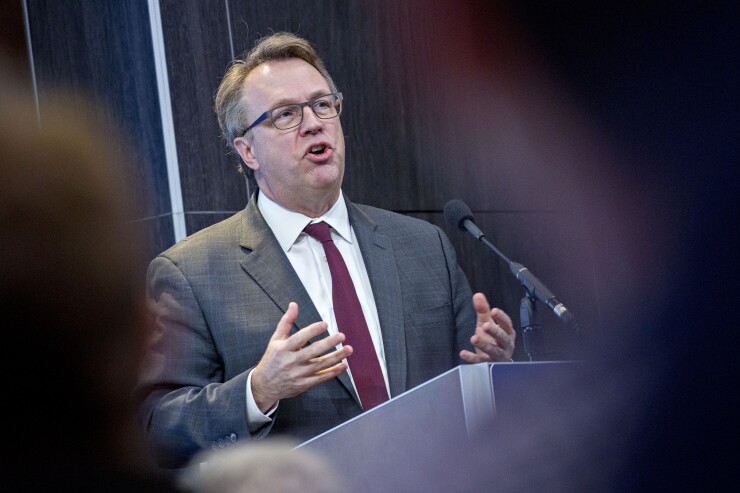Although New York Federal Reserve Bank President John Williams didn't shed much light on the timing of federal interest rate cuts during a fireside chat at Milken Institute's Global conference in Beverly Hills on Monday, he did offer some insight into his thinking.
Amid stubbornly high inflation, the Federal Reserve reiterated in its post-meeting statement Wednesday that it doesn't plan to cut interest rates until it has greater confidence that inflation is moving toward its 2% target.
Most analysts now expect the Fed to hold rates in a range between 5.25% and 5.50% until September, with some concern there will be no rate cuts this year, according to a Bond Buyer report prior to Wednesday's
The Fed's more cautious outlook stems from three months of data that pointed to stubborn inflation pressures and robust consumer spending. Inflation has cooled from a peak of 7.1% to 2.7%, as supply chains have eased and the cost of some goods has declined.
"Eventually, we will have rate cuts," Williams said.

Williams, a voting member of the Federal Open Market Committee, said he doesn't look to any one thing to determine monetary policy, but rather the "totality of the data."
"When I wake up in the morning and think about the data. I am not immediately thinking about what it means for the Fed funds rate," Williams said. "I think of our objectives and whether the economy is slowing down or speeding up. Eventually we will have rate cuts."
He added policymakers aren't just looking at the employment report or gross domestic product.
"It's amazing how much data we have," Williams said. "It's just trying to tease out what this is telling us."
"We are seeing job growth slow a bit, unemployment is below 4%," Williams said. "We are seeing supply-demand get back into balance, which I think is the key to getting inflation down to 2%."
The Fed kept its key rate at a range between 5.25% and 5.50% after its latest meeting. Recent reports on prices and economic growth have undercut the Fed's belief that inflation was steadily easing.
"In recent months, there has been a lack of further progress toward the (Fed's) 2% inflation objective," the Fed said in its latest statement.
Wednesday's statement reflected a shift in the expected timetable after March 20 guidance from the Fed's policymakers had projected three rate reductions in 2024, likely starting in June.
"If they haven't cut by September, I think they are likely to cut in December," said Ken Griffin, founder and CEO of Citadel, during a separate Milken fireside chat. "There is still the question of whether inflation will be a problem. Wage growth has been sticky and deglobalization is happening. Those two things take away the deflationary trend that has happened most of our lives."
He added he is glad the Fed's current mindset is patience because it would be worse if they cut rates and then had to pivot.
Williams also said, the Fed balance sheet wind-down in which it has been selling off Treasuries and mortgage-backed securities has gone smoothly. It has off-loaded roughly $1.5 trillion without market reaction, he said.
He sees GDP staying in the 2% to 2.5% range in 2024, still good, but somewhat slower growth. He is also seeing signs of more consumer caution on spending.
"The economy is still healthy, but is growing more slowly," Williams said.





